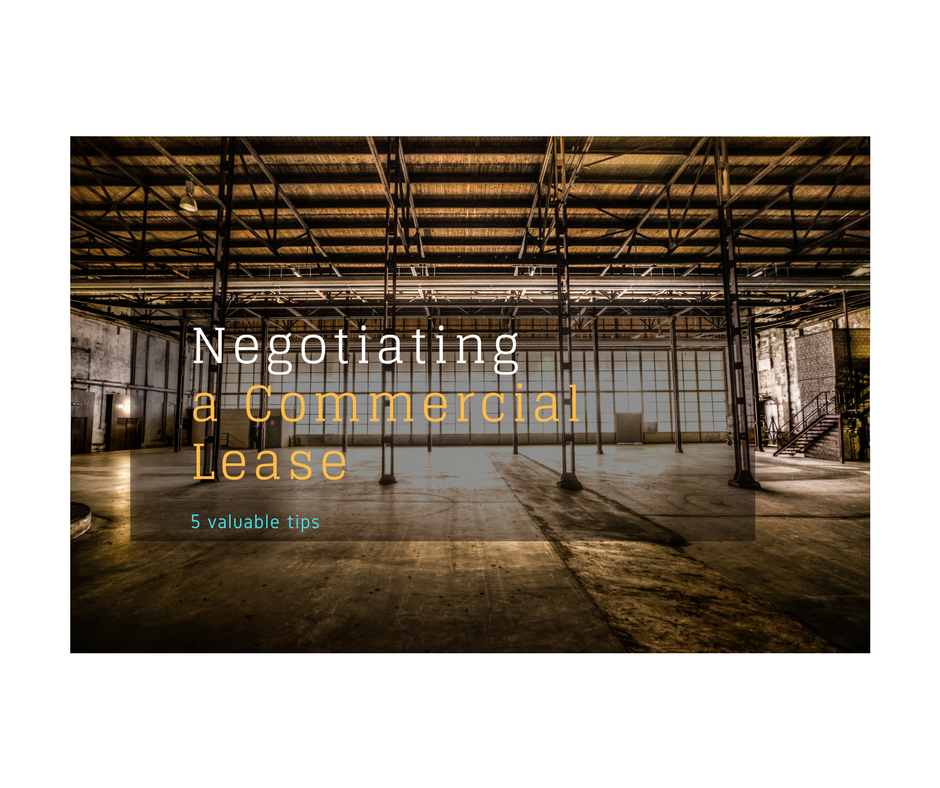Renting a commercial space for your business is not nearly as easy as simply signing on the dotted line. But what parts of the lease are negotiable?
One of the most fundamental parts on the journey to finding new business premises is the lease agreement. If you don’t have the right information or guidance, you won’t know which parts of the agreement are negotiable or not.
With all the moving parts associated with relocating to a new building, you might be asking yourself if you could comfortably secure the commercial lease without seeking professional advice.
Before you decide, we’ll help you out with some useful pointers. Here’s a look at 5 steps to successfully negotiating a commercial lease while avoiding the most common pitfalls.
5 Valuable Tips For Negotiating a Commercial Lease
Don’t assume that the landlord intends to produce a document slanted in your favor. Naturally, the owner has his own interests at heart but that doesn’t mean you can’t negotiate.
The process of going over a commercial lease has many complex components but the principle point is straightforward. You need to read and understand the entire document before anything else. Don’t skim it or rush through.
Make sure you seek outside guidance to clarify anything you’re unsure of and identify any areas that are not in your best interests. Bring these areas to the landlord’s attention and try to come to an agreement that’s mutually favorable.
Here’s a closer look at 5 core factors you should not overlook during lease negotiations.
Evaluate the Lease Length
Arguably the most critical element when negotiating a commercial rental is determining the length of the contract.
Long-term contracts can work well, especially if you have a business where the location is fundamental to its success. In these cases, longer leases can make a nice fit.
Shorter lease terms, ideally with a solid option to renew, give you more flexibility without sacrificing stability. If things work out as projected, you’ll be able to renew your contract. But in the event of a downturn, you won’t be locked into an arrangement you can’t comfortably afford.
Most landlords naturally push for longer contracts so you can use this to your advantage. Ask for some concessions like a rent-free period if you’re prepared to commit for 5 or 10 years. If a longer lease gives the landlord exactly what he wants, make sure you get what you want in return.
Compare Rent Prices Nearby
Checking out the average rent for commercial property in the area you’re interested in is an obvious way to make certain you get a fair deal today. That said, many people overlook this simple step only to end up paying too much for rent.
Don’t forget to think of the future too. If your rental agreement has the option to extend, it’s possible the landlord will want to increase the rent when that time comes. Don’t leave this to chance and include a viable maximum in your agreement to ensure there’s a price ceiling in place. You’ll be happy when you’re not dealt a nasty surprise later.
Remember to stay in control and don’t get pushed around. Any landlord who will not agree to a rent cap for renewal is likely to become unreasonable and might hike the price unfairly. You’re under no obligation to sign anything you view as unfavorable.
Ask for Clause Modifications
A commercial lease is not a unilateral document you’re required to read and then meekly sign. While it’s understandable the landlord will lay things out in his favor, there’s no reason you can’t request beneficial clause modifications.
Before you even move in, it’s wise to push for any essential work on the property to be carried out by the landlord. Once you’re fully moved in, getting improvements made can be tougher. Along with this, if the landlord breaks the lease, you should at least be partially reimbursed for any improvements you’ve made to the property yourself.
Another thing to consider is how the economy is volatile. What happens if you need to relocate or even close up shop completely? Ask for clarification on sub-leasing options in case you need to move.
You also have options for including non-compete clauses to prevent the landlord from renting a nearby unit to your direct competition. Or if your business is dependent on the trade-driven your way from another nearby tenant, a tight co-tenancy clause will let you break the lease if they move away.
Be firm and remember…
If you don’t ask, you won’t get.
Check for Hidden Costs
The type of lease you sign will dictate the way costs are calculated. The more transparently costs are laid out, the fewer chances there are of a financial headache later down the road. Here are several common types of commercial rental contracts:
- Gross Lease: This is an all-inclusive contract. You make a single payment covering base rent with all extra costs rolled in like utilities, property tax, and common area expenses.
- Modified Gross Lease: With this type of contract, you’ll pay a share of incidental costs here with the landlord and other tenants.
- Net Lease: Most net contracts involve paying the base rent along with either property taxes, utilities or insurance. It’s most common to include rent and taxes. A double net agreement means you’ll pay rent as well as taxes and insurance. Triple net agreements mean you’ll pay all of the above along with other costs like maintenance.
Pay special attention here to any maintenance costs and utilities so you’re prepared when the bill is sent your way.
Do what you can to avoid being sucker-punched with hidden costs.
Make Sure There is an Out-Clause
An out-clause, also known as a termination clause, deals with the worst case scenarios if you need to get out of your lease.
There are many reasons why you might prematurely terminate your contract, and they’re often reasons entirely beyond your control. Carefully examine any penalties you’ll have to pay. Don’t be afraid to push hard for better terms.
If circumstances happen where you’re unable to pay the rent, eviction is inevitable. Think about damage limitation. See if you can buy yourself some time to prevent a default by paying an installment of the outstanding rent rather than the full balance.
At a bare minimum, ensure there’s an option to sublease in your contract.
At this stage, in particular, it really pays to seek the advice of a professional. While there are certain things you can do for yourself, don’t leave anything to chance with legally binding documents. This is especially important when it comes to including out-clauses.
Can You Negotiate The Lease Yourself?
If you firmly believe you’ve got the ability to successfully negotiate a commercial lease alone, by all means, go ahead and do that. If you take the time to examine the terms and conditions of the lease fully, there’s no reason you can’t get a decent deal.
How about if you lack the time or confidence to do this properly, though?
Commercial Lease Locators specializes in negotiating leases for commercial real estate to get you the most favorable terms. Since the property management company pays for our expertise, that means you don’t have to.
You’ve got nothing to lose by getting in touch and letting us do the hard work for you. Call us Monday through Friday between 8 am and 8 pm at 512-920-6270 if you’d like a consultation.
Contact Commercial Lease Locators to help you navigate a commercial contract!

